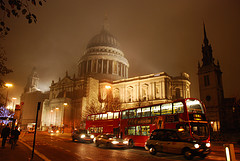3. Paco mustn't abuse spicy food
|
Must
|
We must say thank you immediately.
They mustn’t distract the children's attention. He must have stopped working by ten o'clock. The hurricane consequences must have been terrible. |
Necessity
Prohibition Obligation. Conclusion. |
| Ought to | We ought to employ professional workers in our factory. |
Saying what’s right or correct |
1) The meal must be cooked by eight o'clock.
2) Students must not ride their motorbikes without a helmet.
3) It must have been really difficult for you after the accident.
4) You must be at home before midnight.
|
a) Emergencies.
| |
|
b) Prohibition.
| |
|
c) Obligation.
| |
|
d) No obligation.
|
|
a) Emergencies.
| |
|
b) Prohibition.
| |
|
c) Obligation.
| |
|
d) No obligation.
|
|
a) Emergencies.
| |
|
b) Prohibition.
| |
|
c) Obligation.
| |
|
d) No obligation.
|
|
a) Emergencies.
| |
|
b) Prohibition.
| |
|
c) Obligation.
| |
|
d) No obligation.
|
 |
| King coyote. Creative Commons. |
You have to strike while the iron is hot.
 |
| Madame Pompadour. Creative Commons. |
This idiom means that you should take advantage of the situation now that you can, since the situation is ideal.
 |
| By Tonythesuperperson Creative Commons. |
Do not have to suggests that someone is not required to do something.
You don't have to eat that. You can do it if you want to, but it is not necessary.
Bengali meals: Paco mustn't abuse spicy food
|
|
| By Kspoddar. Creative Commons. |
The Bengalis are great food lovers and take pride in their cuisine. In fact so obsessed are they about food, that the man of the house goes to the market daily to buy a fresh supply of fish which is a must in their daily menu. The most common variety of fish that the Bengalis eat are the Hilsa, Bekti, Rohu and among seafood prawns are the most common ones. They cook using mustard oil which adds on its own pungency. Another very important item of Bengali cuisine is the variety of sweets or 'mishti' as they call them. Most of them are milk based and are prepared from 'chaana' ('paneer' as it is popularly known). The most popular of the Bengali sweets are the Rosogolla, Sandesh, Pantua and Mishti Doi and these four sweets are a must at every wedding besides some other sweets, which may vary as per individual choice. A meal, for the Bengali, is a ritual in itself even if is only boiled rice and lentils (dal bhat), with a little fish of course.
Adapted from Wikipedia.
Click here to learn about the formation of the verb must in affirmative, negative and interrogative.
Click here to learn about the uses and formation of the verb have to in affirmative, negative and interrogative.
Click here to learn about the formation of the verb ought to in affirmative, negative and interrogative.
Once you have learnt about how to express obligation and prohibition in English, we are going to study the modal verb may and its past form might. The former is frequently used whereas the latter has a more restricted use, let's say, a more formal use than may.